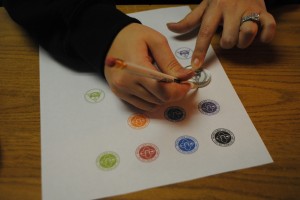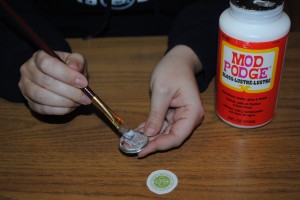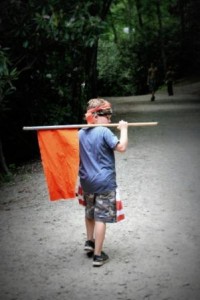MONTHLY ARCHIVES: January 2013
Beating Cabin Fever with Kids
Posted by Phil To the tune of “Home on the Range”: Home, home another day; the skies are cloudy and gray; the kids will not sit, there are no more craft kits, and the wind is too whipping to play. When the first winter school cancellation keeps you home, you thank God for the downtime. After several weeks of overcast days, boredom hits. Try some simple activities to get off the couch and make memories.
To the tune of “Home on the Range”: Home, home another day; the skies are cloudy and gray; the kids will not sit, there are no more craft kits, and the wind is too whipping to play. When the first winter school cancellation keeps you home, you thank God for the downtime. After several weeks of overcast days, boredom hits. Try some simple activities to get off the couch and make memories.
- Get out puppets or costumes and act out favorite Bible stories or children’s books.
- Learn a new board game or play an old favorite.
- Work on a puzzle together. Use a card table so you won’t have to put the work-in-progress away prematurely.
- Read a family novel. Mom or Dad can read one or several chapters every time a school day or event is cancelled. Be sure to pull out blankets and make popcorn to make reading time something to look forward to.
- Make exercise flash cards together. Draw stick figures and write words indicating which exercise to do, such as five sit-ups or 10 jumping jacks. Play with the cards in different ways throughout winter – hide them around the room and find them or let someone draw which ones to do.
- Work on a handcrafted item together, such as sewing a baby quilt, crocheting a scarf, or assembling a birdhouse.
- Create an age-friendly scavenger hunt (indoors or outdoors).
- Learn a new song together as a family – von Trapp style!
- Have “brain blizzards.” See who can think of the most crazy uses for winter gear, such as boots, snow shovels, or even snow.
- Make snow angels. If you live where there is no snow, purchase instant snow at an educational store and have fun experimenting with it.
When life gives you lemons
Winter months are citrus season. Watch for specials on oranges, lemons, grapefruit, and limes.
- Make fresh lemonade.
- Make a citrus salad. Teach your child how to peel, separate, and slice the fruit and stir 3 to 4 cups of several kinds together with ½ cup of sour cream and ½ cup of whipped topping.
- Slice citrus in half. Make prints by dipping the sliced fruit face into fingerpaint and pressing it onto paper.
- Have a smelling and tasting contest – blindfolded!
This article is courtesy of ParentLife magazine.
by Kristen White on Thursday, December 29, 2011
Posted in Just For Parents | Tagged Camp Crestridge, camp parent, Camp Ridgecrest, Ridgecrest Summer Camps, snow days | Leave a reply
Conversation Starter: Free
Posted by Phil Living Beyond Yourself
Living Beyond Yourself
John 16:5-15
Holy Spirit points us to our need for Christ and how we can receive Him
Conversation Starters
How can you keep this conversation going at home? Try bouncing some of these questions around at the dinner table, as you’re driving your kids to school or an activity, or even while you’re shopping together:
For Preschoolers
This week, spend some time talking with your preschooler about what makes God special. Emphasize things like “God loves you,” “God gives us what we need,” “God protects us,” and so forth.
For Children
What kinds of freedoms do we enjoy in our country? What sacrifices did people have to make so we could have those freedoms? How are these freedoms similar or different from the freedom God provided when Jesus died on the cross?
For Students
Why do we spend so much time trying to be free? When have really felt like you were really free?
If you had to describe the Holy Spirit to a friend, what would you say?
What is the hardest thing for you to understand about the Trinity?
Posted in Just For Parents | Tagged Camp Crestridge, Camp Parents, Camp Ridgecrest, Conversation Starters, John 16:5-15, Just for Parents, Ridgecrest Summer Camps | Leave a reply
Crafts With Teeny: Bubble Magnets
Posted by TeenyHello parents, campers, and friends! I was recently asked to start doing a monthly craft blog. Of course I was excited about this opportunity. I love crafting, being crafty and anything with the word craft in it! This is my first blog and I am excited to share it with you. I will be doing a new craft the third Friday of every month. This first one is called “Bubble Magnets” and I am using the camps’ logos in different colors to make them! I typically find all of my ideas on Pinterest. I have created a PDF with both the Crestridge and Ridgecrest logos, in seven different colors. You can find this PDF here. I have made the size according to the small, clear “gems” or glass rocks.
You will need:
– Camp Logos – or you can use scrapbook paper, magazines, pictures, anything!
– Glass rocks/gems
– Mod Podge – or you can use a mixture of ½ glue ½ water
– Magnets
– Scissors
– Paint brush
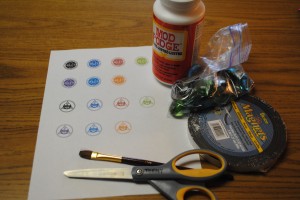
First you need to print out the PDF with the logos. Shown in the picture above.
Then you need to take a glass rock and place it on top of the color logo you want to use. Trace around the glass rock and cut the logo out. You will need to do this for each glass rock since they are not all alike.
Then paint some Mod Podge (or glue mixture) on the flat side of the rock. Place the cut out logo on top of the Mod Podge and press down carefully. If you press too hard, it might rip the paper. Set that aside and let it dry. It should only take a few minutes. In the meantime… trace, cut and Mod Podge more logos!
Once it is completely dry you can put the magnets on the back. I used magnetic strips so I had to cut it to the size of the rock and used the adhesive back. You can also use the round magnets you find at any craft store and you can just glue them to the back. Once the magnet is on paint more Mod Podge around it (not over it) to seal the edges of the paper. Make sure the adhesive has enough time to stick before you try and put it on your fridge!
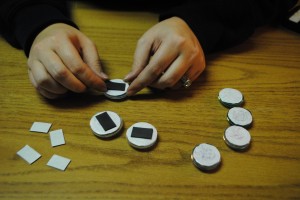 Once it’s dry and the magnet has adhered you can put it on your fridge! I have also tried this with scrapbook paper and they turn out really cute. Let me know if you make these and how they turned out! Don’t forget to check back next month for a new craft!
Once it’s dry and the magnet has adhered you can put it on your fridge! I have also tried this with scrapbook paper and they turn out really cute. Let me know if you make these and how they turned out! Don’t forget to check back next month for a new craft!
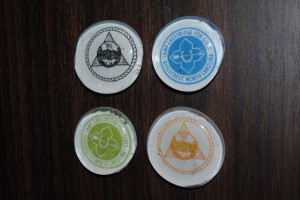
Posted in Just For Parents | Tagged Camp Crestridge for Girls, Camp Ridgecrest for Boys, Pinterest, Ridgecrest Summer Camps, Teeny Crafts | Leave a reply
Winners or Losers?
Posted by Sharon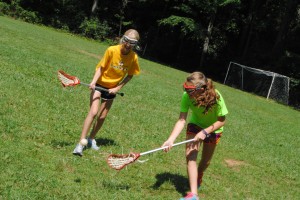 I learned some amazing lessons about life when I was a starting forward on the worst basketball team in the history of the world. We were a sloppy group of pre-pubescent sixth and seventh graders who took to the gym floor on Friday nights in the ugliest uniforms you’ve ever seen. With “St. Mark’s” emblazoned in road cone orange across the front of our jet black polyester jerseys, our hearty band of clumsy wannabes would begin warm-ups hoping “tonight’s the night we’ll win our first one.” We never allowed the fact that we had difficulty putting the ball through the hoop during the pre-game lay-up drill to shatter our dream.
I learned some amazing lessons about life when I was a starting forward on the worst basketball team in the history of the world. We were a sloppy group of pre-pubescent sixth and seventh graders who took to the gym floor on Friday nights in the ugliest uniforms you’ve ever seen. With “St. Mark’s” emblazoned in road cone orange across the front of our jet black polyester jerseys, our hearty band of clumsy wannabes would begin warm-ups hoping “tonight’s the night we’ll win our first one.” We never allowed the fact that we had difficulty putting the ball through the hoop during the pre-game lay-up drill to shatter our dream.
But the dream that refused to die never materialized as we showed up each week to play in a church youth league where every team but ours was manned by towering muscle-bound high school seniors and juniors. For two seasons, we never gained control of the ball on the opening tip-off. In fact, it seemed like we never had the ball. And when the final buzzer sounded, we never walked off with the scoreboard tilted in our favor. No team ever scored less than 100 points against us. Our scrappy team never scored more than 12 points in a game. In my entire two year basketball career, I poured in a whopping two points.
Do you know why I smile fondly as I remember that experience? Because it was fun. Our coach and parents never yelled. They always encouraged. They never made us feel like losers. If and when we scored, the entire place, would erupt with a cheer. Because of that, I can remember every detail of the one basket I made. I’ve forgotten my dozens of shots that missed. When the game was over, we always smiled. Playing for St. Mark’s taught me a lot about attitude, character, and the fact that basketball is only a game.
In the years since my days of basketball “glory”, I’ve had the opportunity to spend a chunk of time coaching teams and watching my own kids play organized sports. I’ve never taken my teams to a world championship nor are the odds great for my kids or any of their teammates to make a living playing games. Yet I wonder why the sidelines, stands, and team benches are peppered, sometimes covered, with parents and coaches who pressure and push their kids with a “succeed at all costs” attitude. These parents and coaches bully kids right out of childhood into the overwhelming frustration of a burned out “I have failed” existence. I must admit, there are times when I’m tempted to go with the flow of these attitudes. Have you ever felt the need to push a little bit harder so your kid’s not left in the dust?
Vincent Fortanasce is a psychiatrist, coach and member of the Little League Hall of Fame. In his book, Life Lessons from Little League (Doubleday), he relates how he asked parent’s at the initial team meeting about what they first ask their children after a game, if they had not been able to attend. The most common question was “Did you win today?” The second most frequent question was “How did you do?” Fortanasce writes, “What was my point? Simply that I wanted my team parents to re-focus away from ‘I want my child to learn to win,’ or the pursuit of perfection, to the pursuit of contentment and confidence; from ‘I want my child to be the best player on the best team’ – the pursuit of talent – to ‘I want my child to be a good sportsman’ – the pursuit of character.” He suggests that the more appropriate questions are “Did you have fun?” or “What did you learn today?”
Plato said, “You can learn more about a person in an hour of play than you can in a lifetime of conversation.” A twist on Plato’s words ring true today: we can learn quite a bit about a parent in a few minutes of observing them watch their own child play. What do you see when you look in the mirror? As you evaluate the role you play in the lives of the kids you parent and/or coach, consider these questions:
Who’s out on the field? Unfortunately, some parents see their kids as a second chance to fulfill dreams they themselves never realized. Best selling recording artist Alanis Morrisette’s gripping song Perfect echoes the experience of too many kids: “I’ll live through you, I’ll make you what I never was/If you’re the best, then maybe so am I. . . you’ll make up for what I blew/what’s the problem. . . why are you crying?”
What’s on your mind? Mark understood when his talented 17-year-old son Travis asked to quit playing ice hockey. The win-at-all costs mind set of his coaches and teammates’ parents had finally gotten to be too much for Travis. Mark says that in youth sports today “the child’s welfare is becoming less and less important. The focus should be on instruction and developing character. But you wonder about some of the coaches and parents today . . . the bottom-line is that I never saw Travis smile when he played. . . I supported his decision 100 percent.” As a result of their decision, Travis Howe won’t be the third generation of the Gordie Howe family to play in the uniform of the National Hockey League’s Detroit Red Wings. For the Howe’s, character won out over winning.
What’s in your heart? Are the desires of your heart to see your child do his/her best. Or, is your heart set on a standard or level of achievement that is impossible for your child to attain. When sports psychologist Rick Wolff worked for the Cleveland Indians, he was surprised to discover that there were a large number of major league ball players who didn’t allow their kids to get involved in Little League baseball. The reason: the pressure on kids to excel beyond their ability and potential. Instead, they encouraged their kids to skateboard, ski, or anything else to keep them from the unnecessary pressure placed on youth league baseball players. After all, it’s only a game . . . and they’re only kids! Let them play and have fun!
What’s coming out of your mouth? “Frustrated parents . . . can attack the umpires, berate the managers and coaches, and demean the players on the field with impunity”, writes Fortanasce. “Some go the full hundred yards in criticizing their children’s teammates – and even their own children.” I’ve watched young kids cower and teenagers become bitter in response. And even if they do respond with improved performance, are those critical attitudes qualities that we want to nurture in our kids? Children learn from example. If we’re going to scream anything, it should be words of praise, encouragement, and acceptance.
In this day and age of increased activity, it’s realistic to assume that most kids will spend some time during their childhood in a uniform participating in some kind of organized sport. Hopefully, you and I will be on the sideline cheering them on. It would be a good idea for all of us sports parents to pinch ourselves and come back to reality. We’d realize that there’s a greater chance of getting hit by lightning than of our child growing up to sport a world series ring, wear the Olympic gold, or skate around holding the Stanley Cup.
Our children will grow up with memories of their childhood sporting experience. Those memories will be either positive, or negative.
I look back on my role as a player on the world’s worst basketball team with a smile on my face. Why? Because it was awesome. When the dust settled, I know that I came away from that “losing” experience as a real winner. Nobody screamed . . . nobody pushed . . . nobody lived their dreams through me. I hope my kids will be able to someday look back and do the same. How about you?
by Walt Mueller
The Center for Parent/Youth Understanding
Posted in Just For Parents | Tagged Camp Crestridge, Camp Ridgecrest, Just for Parents, Loser, parent articles, Ridgecrest Summer Camps, Sports, The Center for Parent/Youth Understanding, Winner | Leave a reply
The best ways to pray with children
Posted by Phil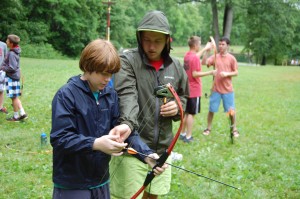 Recently in the prayer class I lead at our church in Oklahoma City, I was explaining to the new children why we take one Sunday a month from their regular lessons to focus on prayer. “We want you to know God, not just know about Him, and hear God, not just hear about Him,” I explained.
Recently in the prayer class I lead at our church in Oklahoma City, I was explaining to the new children why we take one Sunday a month from their regular lessons to focus on prayer. “We want you to know God, not just know about Him, and hear God, not just hear about Him,” I explained.
Eight-year-old Andrew, who has been in prayer class for several years, piped up to help get the idea across: “It’s like me and President Bush. I’ve seen him on TV lots of times, especially since 9-11, and read about him in the newspaper, and heard my parents talking about him. But I have never had a conversation with President Bush, so I don’t really know him, do I?”
Andrew was exactly right. If we want our children to know God and not just know about Him, we need to teach them to pray and pray with them. Children could do all kinds of worksheets about God and hear stories about Him, but it is when they talk and listen to God that they begin to know His heart.
Children need to know early in their lives that they can talk to God just like they talk to Mommy, Daddy, or a best friend. They need to understand that God is there and attentive to what they have to say. Instead of putting them on hold or playing a recorded message, God is always willing to listen – whether they are on the playground, at a friend’s house, in the car, or at church.
You can pray …
Heart to heart – Share with your child a time that you prayed and received the answer in a surprising or dramatic way.
On the spot – The next time your child comes to you with a problem or worry, instead of saying, “I will pray for you,” do it right then. Even if it is a short prayer, you will be demonstrating the important principle that God wants us to cast the care of all our concerns on Him and pray about everything.
Through the newspaper – Pass out sections of the newspaper and ask each child to come up with one concern to pray about.
Modeling: How to learn prayer
One of the first ways children learn the importance of prayer is hearing their moms and dads pray. Since Josh was born, his dad would pray for him each night at bedtime, asking for God’s protection and love to fill his heart. When Josh turned 2 years old, his parents added a short nightly reading from his Bible. Shortly after age 2, Josh began to join in by looking around his room and naming everything he could see to thank God for – blankets, puppy, Mommy, Daddy, new shoes, toys, the nightlight, eyes, ears, nose. He thanked God for the most interesting items! But it was not only Josh that was growing spiritually. Hearing her son’s simple prayers, Josh’s mom, Sandy, could not remember the last time she thanked God for her sight, hearing, shoes, clothes, and all the other blessings in her life.
Get out of the ruts of prayer
One way to banish the “nothing to pray for” or “prayer is boring” complaint is to get out of the ruts of prayer by using prayer targets and making prayer active. Use a game I call “Musical Prayers.” Place a chair for each participant in a circle. Tape a prayer target to each chair. Begin playing music and have everyone walk around the chairs. When the music stops, each person finds the nearest chair and prays for that need.
Use an inflatable world globe and pass it from person to person. When the music stops, the person holding the globe can choose a country and pray for the children in that country to know about Jesus.
Take your children on a prayer walk. Children are terrific prayer walkers because they enjoy movement and being “on site” makes the prayers more meaningful and concrete. To begin, walk around your neighborhood and ask God’s blessing and salvation on each family. Pray for the children in each home.
Give children the freedom to talk to God in different postures: sitting, standing, kneeling, marching, or bowing. When you have family prayer time, allow each person to choose a different posture in which to pray.
Pray a blessing
Praying a prayer of blessing on your child’s life each night at bedtime (or other times of the day) can bring comfort, reassurance, and hope to your child’s heart. Pray for God’s favor, protection, and peace. Thank the Lord for something specific – a gift, talent, or quality in your child. You can use a Bible blessing such as Psalm 5:12 or Numbers 6:25 or speak from your heart. When you pray scriptural blessings, you are speaking words that match God’s desire for your child.
Thanksgiving
An essential part of prayer is simply saying, “Thank You, God.”
Blessing basket – Fill a small basket with little slips of paper. Encourage family members to write or draw pictures of things for which they are thankful.
Best part of the day – Ask each child to say a sentence prayer, thanking God for the best part of her day.
Family journal – Keep a notebook full of things for which the family is thankful.
As you try different ways of connecting with God, children will learn that prayer is one of the greatest adventures in life – to call on the God of the universe and then to hear from Him. As Jeremiah 33:3 says: “Call to Me and I will answer you and tell you great and wondrous things you do not know.”
by Cheri Fuller on Tuesday, September 27, 2005
Posted in Just For Parents | Tagged Camp Crestridge, Camp Parents, Camp Ridgecrest, parent articles, Ridgecrest Summer Camps | Leave a reply
Conversation Starters: Choose to Change
Posted by Philmake the decision to follow God’s ways
Conversation Starters
How can you keep this conversation going at home? Try bouncing some of these questions around at the dinner table, as you’re driving your kids to school or an activity, or even while you’re shopping together:
For Preschoolers
Show me things in this room that are the most special to you. Why do you love that toy/book/person so much? Can you guess what is most special to me in this room? Guess what’s most special to God in this room. (Use this discussion to emphasize that your child is God’s special possession.)
For School-Age
Does it seem like kids who misbehave get most of the attention in school? How does that make you feel? Is it worth it to keep behaving and doing your work even when you don’t always get noticed and rewarded? Why? (Point out from Malachi 3:16 that God takes notice when they do the right thing.)
For Students
How much contact do you have with other Christians during the week? When do you get a chance to talk about God? How do you and your Christian friends support one another to keep living for God?
Posted in Just For Parents | Tagged Camp Crestridge, Camp Ridgecrest, Conversation Starters, Malachi 3:13–4:6, Ridgecrest Summer Camps | Leave a reply
